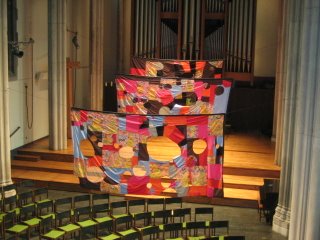



These are images from my thesis which is referred to in previous blogs. Last week, on March 22, I performed a ritual around this installation where I invited friends and family to honor our grief. I reflected upon my own story with the death of my mother and mingled this story with Mary's story in chapter 20 of John's Gospel. I asked the congregation to paint and we concluded in communion. But, early in the service, I spoke these words:
Why are you weeping? Our Savior asks us why we might weep. But, we know that something has changed. Our world has turned upside down. And in all of the uncertainty of what might be, there is a hole. Just a hole. A big, vacant hole. Nineteen years ago, I was the one gazing into this vacant hole. My mother had spent most of my childhood wrestling for her life at the gripping hands of cancer. We didn’t really know that much about cancer then. And it was certainly not something that you shared with your seven-year old daughter. But, soon, something changed. And she was gone.
Maybe it didn’t need to be explained. Maybe there are no words to tell a child that her mother has died. Maybe there are no words to really tell this story.
But, I still remember. I remember standing in the bathroom when my mother lifted her shirt to show me. She has just had a mastectomy, a word I wouldn’t know for a long time. But, I remember the jagged wound that lined where her breast once was.
I weep with Mary. She was left to gaze into this big, vacant hole. And she wept. It is only a moment. There is only a moment for sadness. There is only a moment to mourn. And, then it is over. Three verses later, there is a new beginning. This sacred story that offers us such hope and wonder tells us that he came back.
Why are you weeping? It wasn’t a kind question. We’re supposed to let go. We’re not supposed to cling. But, we can’t help but notice the hole. Why are you weeping? Three days after my mother died, one of my classmates stopped me in the hall at school. She asked if it was true. She had heard the rumors. She wanted to know if my mother had really died of breast cancer. I nodded. Oh, she said. My aunt lived through it.
Why are you weeping? She only had a moment. But, it didn’t happen like that for me. That’s not my story. My mother never came back. There is just a hole. Just a big, vacant hole. My mother died when I was seven. I used to introduce myself with these words. Hi. My mother died when I was seven. And I’m still weeping. There is still a hole. It hasn’t gone away. I’m not quite certain what to do about it. It was only recently that I decided that I could paint it. I’m not sure if it articulates my grief. I’m not sure if it’s really about Mary’s grief. I’m not sure if it’s just scraps of fabric sewn together to try to piece together the holes.
I’m not sure if it’s a creation for all of us. Mary wasn’t alone in her grief. And even if she was alone at the tomb, Mary would have shared this hole in her heart with friends and loved ones. Maybe I’m waiting for you to fill in the holes. Maybe you are waiting for me to caress your holes. It might not be a moment. It might not answer all of our questions. It certainly might not heal us. But, it might give us a space for the holes. It might just give us a space to weep. Just to weep….


